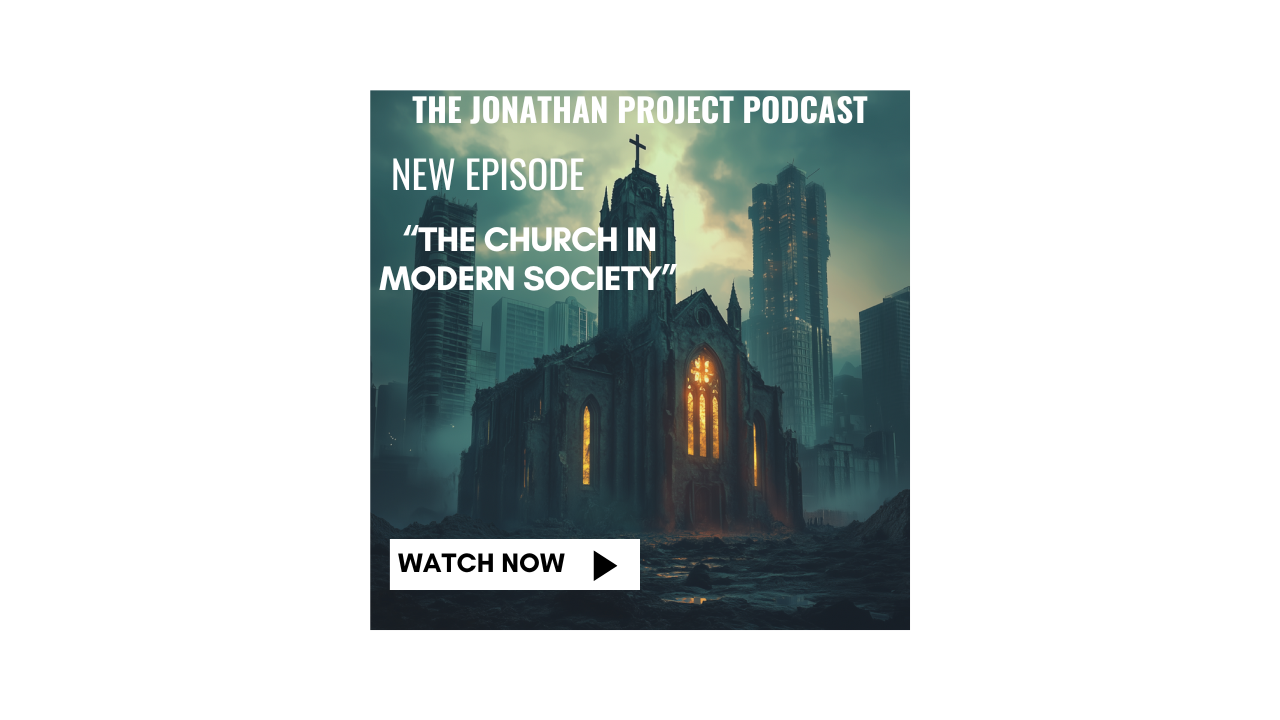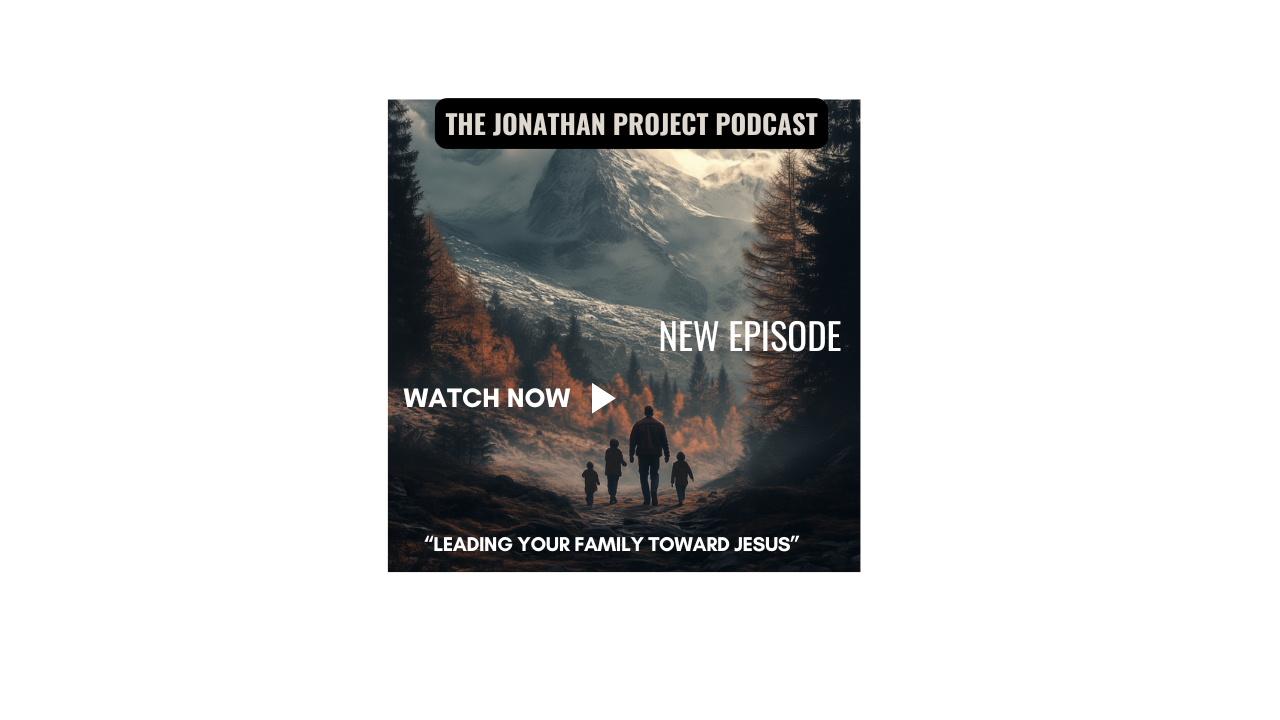[00:00:10] Speaker A: Welcome everyone to another episode and season three of the Jonathan Project podcast. Our purpose is to help men navigate the complexities of the world around them and to be the iron, sharpening iron, becoming those men that God wants them to be. And we take the biblical example of Jonathan and his friendship and loyalty to his friend David as the inspiration for this podcast. If you want me or Jason or both of us to come on out to speak to churches, businesses, youth groups, you name it, please reach out to us at thejonathan project podcastmail.com Again, thejonathanproject podcastmail.com welcome to the show. Yeah, season three. You know, I remember when we started.
[00:00:58] Speaker B: Season one, episode one, and we got 20 weeks ago. What's that?
[00:01:05] Speaker A: I said 20 weeks ago now 20 weeks.
[00:01:10] Speaker B: Wow.
Well, I just remember getting all that fan mail.
That's why I go with handwritten letters. Takes way more effort to tell me bad news.
[00:01:21] Speaker A: Oh, my goodness.
[00:01:23] Speaker B: But I still. 6. 1300. 1300. Yes. 13 comments. 1300.
[00:01:32] Speaker A: Oh, yes. I think it was about their bounce. Yeah.
[00:01:35] Speaker B: And easily 90 of those being negative.
[00:01:38] Speaker A: Well, we're going to talk about that. That kind of ties into our first episode here in season three. What we're talking about the church. Church's impact on society and where has it gone? Right.
[00:01:49] Speaker B: Yeah.
So no kick it off. Yeah.
[00:01:53] Speaker A: Well, you know, I find it interesting. So, you know, there's different statistics out there. I'm sure you have the numbers. But the bottom line is this, is that the church, and we can spend a lot of time specifically talking about America, where we both live, it has had a lessening impact, positive impact on the world and the community around us. Right. Like that is a actual thing. The church attendance is down. Right. There are people, young people, especially this generation, Generation Z, which is the youngest name generation out there, I believe. You know, as they're hitting young adulthood, a lot of them don't find any value in church. And what that translates to here, you know, kind of our open, you know, overview here up front, is what that has really translated to. You see that manifest in all kinds of ways from the political spectrum, our economy, you know, schools. A lot of the issues that pop up in schools really is been the lack of the church and that moral grounding towards the truth that is Jesus Christ. And it's really a sad thing to see.
[00:03:01] Speaker B: You know, you're right. I look at. So I look at church decline, Right. At one point, 90%, like in the 70s, 90% of America said, hey, we are a Christian. We are Christians. Right. And we talked a Couple of episodes ago, I think it's down to like 60%.
[00:03:18] Speaker A: Yeah.
[00:03:18] Speaker B: Right. And church attendance has plummeted.
But when you look at it, like, when I look at it from the lens of church is an organization of believers. Right. And I can replace the name of church with. With any collective group. Yeah.
And just for. Just for thought. Right.
And you see that when Jesus is taken out of the equation, you do see things. And we talked about Romans, how In Romans chapter one, I think it's verse 20 when he talks, or 21, 22, somewhere in there, he talks about, hey, God turned them over to a reprobate mind. And you see things begin to play out because they ignored God and they said, hey, I'm not giving any glory to God. This is none of God. So this is kind of what you got. And we see that as church, a smaller microcosm of. Now, believe me, churches do give glory to God and so forth. But people look at why is church attendance down? Why is. What's going on?
[00:04:28] Speaker A: Well, I mean, there's a lot of factors to it, to be quite honest.
I. And we kind of talked about this in a couple episodes, the last couple episodes of season two. If you go back and listen to those from the political spectrum, but. And social media, when you look at the church in America specifically, which is our reference in our experience set, what you see a lot of is the church in America over time has become corporately looks a lot like the world. And I think that is causing some issues where the church should be like the salmon that swims upstream. All the other fish are going one way. Will the church be going the opposite direction? What we find is these progressive movements, the name it and claimants, and some of these things that scratch the ears and tickle the fancy, but they're really not grounded in truth. And when you don't have something grounded in truth, what inevitably happens is it falls apart. And so you take into those pressures and the influences of. Everyone now has this thing called social media and the 247 news cycle where you can get a lot of different views and the adversary uses that. And if the church doesn't have a voice and a standing, then it gets lost. It gets lost in the noise. And what you see is a degrading of the family. The core, the nucleus of a society and of a culture is being degraded, to say the least.
[00:05:53] Speaker B: So I think that's interesting. You know, we get away from our core principles, right? From the tenets of what it is that made us, that made it what it Is whatever what the Bible says, hey, this is what church should be. I think about that. When you get away from the foundational elements of anything, like, I'm a big. I like the deadlift. Right. I think that's an important fundamental thing.
When you look at the church and you go, okay, what were we there for? It was iron, sharpening iron. It was about sharing the gospel, the good news of Jesus Christ.
It's not about anything else. Right? Yeah, that's not what it's for. It's for sharing the gospel.
[00:06:39] Speaker A: Right.
Well, I think Christians also, to be honest, Jason, and to not make this where anyone feels out there, especially all our believers, feel like, oh, well, you know, you guys are just beating up on the church.
There's other things going on. No, what we're saying is the church has to. Even in these tough times, these days that are very dark and evil, to be quite honest. And we're going to dive into that, into a later episode in the season. But there are pressures and there are challenges out there for Christians. Namely, let's think about the social pressures, the fear. And again, fear is never from the Lord. So we should just put that up front of being ostracized or misunderstood when speaking openly about faith. That is so easily to happen. Now, the cancel culture, if you would, that I think that causes a lot of problems in the church and they want to have more programs and make it appealing again, trying to be the fish that swims with everybody else. Cultural acceptance. Right. Pressure to conform. You know, we don't want to offend anyone. Well, it's not that we're trying to offend anyone. We're trying to give them the truth. And we should do it with love and grace. And then moral relativism. Right. That shift to live your truth, you know, that is a common thing that we've heard. You hear it on social media. And that mindset is completely counter to biblical values.
And that's some problems, Jason.
[00:07:59] Speaker B: No, I agree with you. That is a problem. Right. Like, you don't get to pick your own version of truth. I don't get to pick my own speed limit when I go down the road at all. Right. I thought about. Have you seen the movie the Jesus Revolution? It's on.
[00:08:14] Speaker A: I haven't.
[00:08:15] Speaker B: It's on Amazon. It's on different ones. About Chuck Smith and about during the 60s and 70s, said this massive movement. And the guy says something very profound in there. He says people are looking for answers. They really are.
And as a church, you have the answers.
And so it's where Chuck Smith and a lot of the other pastors, I listen to him, I listened to John Kierson, he was also in that movement. And he said, they just kind of went through the Bible. They said, hey, this is what it says. This is, this is it. Right.
And they had a massive conversion, a massive, you know, revival.
So I think just like you said about the salmon that's swimming upstream, if you're going with the stream, you're not really much different.
[00:09:11] Speaker A: Yeah, no, you're right. And you know, the church is meant to be a light. It is meant to be salt, right? And salt is a preservative. It helps preserve a culture. It helps as much as meat or salt, preserved meat back in ancient times where Jason wishes he could run and write around and write his letters and all those kind of things. But yeah, you know, the church has lost its flavor in a while, corporately has lost its flavor. There are still a lot of good Bible based churches and there's still a lot of believers. But I think about this example and I know I want to tee this up for you, Jason, to kind of spin off and talk about, when we talk about the church, what does the church look like to an outsider? And I want to give a very famous example of that. So Gandhi, right, the man who read the revolution in India, very famous, right? He talked about the caste system in his autobiography. And one of the things he was searching for, a way to galvanize the people to say that, hey, this system, the caste system is absolutely wrong. And so one Sunday morning, Gandhi, before he launched his revolution, he decided he would visit a Christian church because he had been inspired as he had heard about this man called Jesus, a man who came from very humble beginnings, as the Bible describes. He led this revolution in a way that was non revolutionary if you think about it. He didn't go against the superpower in the way that so many people thought, but he changed the world. And so Gandhi was inspired by this. So he goes, he's greeted by door ushers and he's stopped. And he was told he was not welcome. He couldn't be permitted to attend this particular church because it was for high caste Indians and whites only. So he was neither high caste nor was he white. And because of that, because of that, let's think about this. Billions of people who have now followed Gandhi, right, and gone against the scripture of Jesus Christ. And this is why I say one Christian, one church can have a tremendous eternal impact. He turned his back on Christianity and basically what he says Is, and I'm paraphrasing, but you can go and look up. His quote was like, if there's Christianity in a case system within the church, then I'm better off staying where I'm at.
So this is what we see. A lot of people now we pull this back into the lens of what we're discussing. There's a lot of people that look at the church and they are absolutely turned off because of the Christians in it. Right? Like what Gandhi said, if it weren't for Christians, I would be a Christian. And we should take pause and think about this. What do you think, Jason?
[00:11:55] Speaker B: No. So, all right, people come to church and you know, my family, we visited different churches, we go to different ones. And I absolutely want to know how welcome we are. Right? Like, that's one of the things I look at, how well integrated we are because we both share the same best friend.
I love Jesus, you love Jesus. That's a pretty common. That's a pretty significant common ground if you really think about it, Right?
And so, hey, I've been to some churches that, man, they are really, they embody the Christian behavior, right? Like, they're very welcoming, they're very loving. I really do. And of course, I've been to some churches where I fill out a card every time and I always check, would love to hear from your pastor. And I've been to one church a couple of times and actually checked that block twice. And you know, it's crickets. So when you think about what Gandhi went there and he said, hey, I want to know how much the organization cares about me. Right? He really does. And in psychology, we call it perceived organizational support.
So if anybody doesn't know this, just like with a job or whatever or lost person comes into a church, they're not only evaluating, they're looking at that church and going, what's that going to be like for me? Right.
[00:13:27] Speaker A: Yeah.
[00:13:28] Speaker B: That's why a lot of people look for youth programs, so forth. But when I look at what centers around perceived organizational support, we know that it comes from four primary antecedents or precursors, Right. One is the employee organizational relationship. Right. The other is human resource practices, which the church has none of that. Rewards and job conditions, how nice are they? How fair are they?
The third is, of course, by organizational members.
And sometimes people just will always perceive negativity. But the church, everybody goes there looking for this, right? They evaluate.
I hate that because as a church, biblically stating.
And we should own the ground in all those areas.
[00:14:25] Speaker A: Yeah, absolutely.
[00:14:27] Speaker B: We should Jesus was super welcoming.
Think about that. But he was also.
He didn't sway on what was right or wrong. He was very welcoming.
And he offered forgiveness. Right. Which is a pretty good reward, forgiveness of sins.
That's actually a great reward.
And it was fair and open to everybody.
And I think that's really important, you know, so. All right, Colton. Yeah, we know that leaders embody their organization.
They just. They do. It's this thing called transference. You know, it's just the way it works. So as a. As a pastor, as a Sunday school, or as the person that is a member of that church, you embody that organization.
So how friendly you are next to somebody really does speak about that church. Does that?
[00:15:30] Speaker A: No, it does. No, it absolutely does. And you've heard me say this, and it's important to put this out here, I'll share my experiences, is that it became a stumbling block for me, this thing with church. And a lot of people don't realize this, but the most segregated day in America is Sunday. And it's usually between the hours of 9am and noon are the most segregated days in America.
And when you go to a church, the church corporately, right. Not individual churches, but most of the time, they fall into homogeneous ethnic groups, meaning there's all black church, there's all Hispanic church, all Asian church, all white church, predominant. Well, I got a news flash, right? Heaven is not going to be like that. Yeah. I'll put it into a personal standpoint. Jason has heard this. When I was about 8, 9 years old, grew up in a very small southern town in Texas. And we had this thing. We lived on one side of the railroad tracks, and the, you know, the predominant group in two predominant groups in town were three were Mexicans, blacks and whites, and the whites lived on the other side. Well, we had this thing at our. At our Baptist church. It was called Friendship Week. I'll never forget this. And every single white church in town had a night, Monday, all the way up through Sunday. And it would come. We sing some songs, their pastor would preach, right?
And then they go to the fellowship hall, eat some food. We'll see it repeat, rinse and repeat next year. And I'll never forget, I asked my grandfather, who I have no doubt is in the kingdom right now, I asked him, I was like, when do we as black people get to see Jesus in heaven? What's our day?
And he. He looked at me, he's like, whoa, whoa. How does this kid come this. And I'm looking at him like, well, we only get together in fellowship once a year. You know, so obviously there's different. Jesus is different for us than them. And I struggle with that, Jason. I struggled with being perceived as I was less than.
[00:17:44] Speaker B: Yeah.
[00:17:44] Speaker A: You know, when I grew up and I went out into the world and go to different churches and like you said, you don't get the warm feeling. You don't get. You get the. The music kind of stops, like, why are you here? Right.
And that impacted me. Now, you translate that to the bigger church and we use the Gandhi example. How many people are going to miss eternity? The greatest choice that they ever could have made because they ran into the wrong church and the wrong people. Right.
[00:18:13] Speaker B: Yeah.
[00:18:14] Speaker A: The church has to be the shining light. It has to be the hands and feet of Christ. And those hands and feet have to touch all people. There's a reason why he said, go into all the world. All the world doesn't just mean where you like to and you have your echo chamber and everybody does the same thing. He goes into all the world and give them the good news, which is Jesus Christ came to die for all people so that they would have the ability to have eternal life. You know, there's not going to be the wrong side of the tracks in heaven. There's just not.
[00:18:46] Speaker B: No, no. They do say everybody gets a job in heaven, you know, And I think I, knowing me, will probably just be the guy that sweeps.
That's probably the best I got.
[00:18:58] Speaker A: I'll be happy. The sweet.
[00:18:59] Speaker B: I'll be happy. Sweet. But so I heard what you had to say, really did. Made me stop and think, you know, as a church, you represent Jesus Christ as a collective body of Christians because it says for two or more, you're gathered in my name there I am too. Right. And so you present that, and I think that's a golden opportunity to interact with non believers. Right. So interesting little study and bear with me and we'll connect the dots. So this person had a study in 2017, Kim, and it says that in South Korea, diversity actually hurt their production. They had hired people with similar academic backgrounds and capabilities, and those had went forward and that's how they formed their high performance teams. Right.
Well, but what they argued was is that an increased level of perceived organizational support overcame that. And so I thought about churches and I thought about what you had to say about diversity. And, you know, as we come together and so forth, and at Jesus table, never forget, there was. There was Matthew and there was Simon the Zealot.
Two people on polarized opposite ends. Worse than Any political divide we've ever seen, and there they both were. But as they come together for Jesus Christ. And that's really the role of the church. Right. Like, we've got a common best friend. Yeah, let's, let's talk about him. Hey, if you're not on board with salvation, let's get you on board with salvation and let's, let's move forward. Right. I think in today's society, man, there's so much convoluted information out there, but really there's one truth.
[00:21:02] Speaker A: Yeah.
[00:21:02] Speaker B: And I look at all these kids and everybody's like, hey, there's so many people out there who are hurt.
Think about that. Yeah, they go through social media, they go through wherever they are and they're evaluating themselves. We've talked about it. And they always come up going, man, I'm not enough. I feel bad, I'm depressed. I'm this or I'm that. And I think as a church, you've got a golden opportunity to embrace somebody and say, I want you to know that Jesus Christ loves you. I love the way you are. I love you. Right.
And let's talk about some salvation.
And you've got a phenomenal opportunity.
Right?
[00:21:49] Speaker A: No, absolutely. You know, and, you know, the impacts as you kind of described, like the opportunity and I think about the scripture and, and you'll have to forgive me, I didn't, I didn't research and have it off the top of my head. But I can, I can paraphrase. It is, you know, the harvest is, is plentiful. Right. But the workers are few.
And yeah, you know, the church being in decline in American society, you look at some of these kind of key pillars like social support, because historically the church was that strong social network. Right. For those individuals to find community and comfort in times of hard times, which is readily less available. Right. Volunteering in charity work, you know, going out, feeding, feeding America. Right. And going to these different countries, missionary work and doing great things. That has been the hub and the kind of the central spoke for the church. And when we've had less involvement in that, then there has been a decline in being able to feed into clothing again to be the hands and feet of Jesus. And then the moral compass, I mean, we could probably do five episodes on just the moral compass of our society right now and how skewed it is. Well, when you look at when you took out Jesus from so many aspects of American society, every aspect, to be quite honest, then you have a natural result that the moral compass of the nation Depends on the person who is running the show or the group of people that are running the show. Right? And we see the net result of all of that. And then just civic engagement, right. Voting, right. We're getting ready on. By the time you hear this folks out there, it will actually be election day. So please go out and vote.
You go back and listen to our episode. If you. You want to get some left and rights, if you haven't got that from your local church, which always want to support the local churches, but there are some left and right as Christians that we should apply to, but all the.
[00:23:51] Speaker B: Left and rights not being political parties, just.
[00:23:54] Speaker A: Yeah. And not. Yeah, right. Not political parties. Great point, Jason. But all of these impacts, right, all of these things that we just kind of talked about, they really tie back to the church not being that city, that light set up on the hill that everyone can see and kind of truth flows out, which is Jesus Christ.
[00:24:14] Speaker B: From there, you know. So we talked earlier and, man, I've been sitting here thinking, of course, if you can, as you can see now on video, you can see I'm writing notes.
But we talked about the perceived organizational support, right? So the greatest influence on that is what's called the leader member exchange, right? Whether it's positive or negative, that determines whether or not you believe the organization cares about you. So as a, as a Christian and you have people come in to visit your church, you are the leader in that moment, right? I mean, you really are. God called you for that moment. People go, I'm not really a leader.
If you are the person engaging, you are leading that movement, right? Then you're leading that engagement.
And that's the truth, right? So everybody asks this in that perceived organization. So, you know, you go into a business, they. And you go to work for somebody, the employee asks, am I valued by my leader and that organization? So as a Christian, as a church, people that come in, they want to know if they're valued by the organization. They want to know if they're valued by the leader. Well, Jesus Christ is our leader. He should be our leader, right?
[00:25:40] Speaker A: Yeah, absolutely.
[00:25:41] Speaker B: And 100% he values you.
Does the organization value. Yes, it does. Yes, it does.
And that should be where we are. Think about that. Think about if when people go to a church, man, they're coming in, you don't know what they've had going on the night before or whatever, but somehow they've made it here. I wonder, man, there's got to be a statistic out there of how many visitors are there out there. How many churches receive visitors on a regular basis? Right. How many people are touching, going into. Touching into the organization and then compare it to how much the organization goes out. We used to have visitation nights. Do you remember those? Where you would go and if somebody filled out a card.
[00:26:34] Speaker A: I don't remember those.
[00:26:34] Speaker B: They would, they would go visit. Like if you put down here, I'm absolutely open for a visit.
[00:26:39] Speaker A: Yeah.
[00:26:39] Speaker B: Probably telling my age. But we would, you know, you get in the car and you would go and do that.
[00:26:47] Speaker A: I remember something similar. Like my grandfather and I was, I was a little guy, but I remember I would, I would tag along with him, would be visiting the sick in the shut ins. Right. Like it was a list. And as a deacon, he would go and he would talk to these people and pray with them. And this was like a weekly thing. And that's again, that community engagement as a man. Like, that was a great example for me as a young guy watching that and you know, as a little dude sitting there and like, I didn't know half of what was going on. But I'm like, I'm hanging out with grandpa. I'm gonna get some ice cream at the end of all this. So I'm gonna sign me up.
[00:27:22] Speaker B: So I went so that we could crank the, you know, they. They needed a strong back and carver thing back.
[00:27:29] Speaker A: I thought it'd be like a horse for you, bro.
[00:27:31] Speaker B: Yeah, well, you know. Yeah, that's not funny. Those aren't team building comments.
[00:27:37] Speaker A: I'm just telling you.
[00:27:40] Speaker B: So you also talked about it being the salt, right?
[00:27:44] Speaker A: Yeah, salt.
[00:27:45] Speaker B: So I was sitting there and I thought about this the other day, you know, as I was kind of doing some work outside. Salt. You know, salt. You mix a strong acid in a base, you get salt. It doesn't go away. Like salt is always there, Right. You know, it's funny. Salt kills. Kills weeds. So it's.
I don't. If a salt loses its flavor, like, I really, I wanted to sit down and think about when would it ever lose its flavor? When it's diluted. I'll tell you when it does. It's when it's diluted. That's it.
[00:28:22] Speaker A: There you go.
[00:28:24] Speaker B: Anytime salt is in its. In its purest form or it's in its form, right?
[00:28:29] Speaker A: Yeah.
[00:28:30] Speaker B: And there's nothing else with it.
It is salt.
But if I take a teaspoon of salt and you eat it, it's salt. Right. But if I take that same teaspoon of salt and I mix it into 10,000 gallons of water or 10,000 gallons of whatever, it loses its flavor. Right?
[00:28:53] Speaker A: But that's the same thing. You know, let's take the analogy and let's, let's overlay it with what we've been talking about here today is the church and why Jesus used that example. You're right. When the church is collected, when the church is focused, it is pure salt. It is strong as flavor. It doesn't change.
[00:29:13] Speaker B: Right.
[00:29:13] Speaker A: It impacts the community. It flavors and enhances those things around it. But when the church becomes diluted and the church you kind of like, what's going on here is it looks a lot like the world, then you have lost your flavor. And Jesus says you should be thrown out and trampled upon. Again, Jesus being quite blunt for all those that don't think that he was quite blunt.
[00:29:33] Speaker B: Yeah, he, he was pretty clear on that.
[00:29:35] Speaker A: He's pretty close to clear on every time he spoke.
[00:29:38] Speaker B: There's a church nearby us that does a food drop. Talk about hands and feet. Right. And of course, you know, it's up there for those in need. And I think about like my grandparents generation, they were like, no, that's for people really in need. Right. They were things like that. And even in today's society, this became a point of discussion for us was as I go by there, I see this brand new Tesla pull in and getting their free bag of groceries, right?
[00:30:10] Speaker A: Yeah.
[00:30:11] Speaker B: And you know, and of course, my wife, she goes, well, you know, we really don't know.
They could be getting it for someone else.
And of course. Right. Hey, we don't know. My response back was, sure, if you can afford a Tesla, you probably can afford to go buy somebody a sack of groceries. But, but just putting it out there, just putting it, I'm just, hey, that's multiple optics. Let's. Let's look at multiple angles.
But that church still, you know, it's a good opportunity and they were still there and they still gave them the sack of groceries is, you know, I'm sure they, their car automatically pulled up and made sure it had the right spacing and all that stuff. My truck does not have that.
[00:31:00] Speaker A: Oh, I love it. No, I understand.
[00:31:03] Speaker B: But I do think, you know, as a church, it is. It's about keeping the light. It's the one thing. It's a constant, Right? It is light. No matter how you study it, no matter how it's listed in any chemical reaction or it's listed in any chemistry equation, physics equation, it's constant.
It's a constant number. And I think that's as we are the light and the salt. You got to be that constant. It's about the gospel and yeah, influence people for good. Or you can pass up the guy who turns out to be pretty influential like Gandhi, and off you go, right? How many people didn't make it into heaven because they thought that was the right. The right path?
[00:31:54] Speaker A: I don't know. But we're all going to have the ultimate one on one. But there's a good bow to put on to yet another great episode of the Jonathan Project.
And if you want us to again come out and speak to you, please reach out to
[email protected] and thejonathanprojectpodcastmail.com this episode and every episode comes out every Tuesday morning on your favorite podcast platform, Spotify, Apple. We're just now being listed on Amazon Music for all those folks out there, iheartradio. And the list goes on. So please check us out, subscribe so you don't miss any episode. Go back and check out the old ones. Leave us comments, feedbacks, continue to pray for us, but on behalf of myself and Jason, we thank you. And Jason, you got anything else for the folks before we close?
[00:32:47] Speaker B: Now that we're doing video, our chances of getting called out to go help going to go through the floor.
[00:32:54] Speaker A: Through the floor.
[00:32:56] Speaker B: What's that?
[00:32:57] Speaker A: I said through the floor. Through the roof.
[00:32:58] Speaker B: Through the floor. Now they know what we look like.
[00:33:00] Speaker A: They're like, oh, man, it hurts when you say things like that.
[00:33:03] Speaker B: Oh, my gosh, I resemble that remark.
[00:33:06] Speaker A: All right, well, we have fun here at the Jonathan Project. All right, folks, again, we'll see you Tuesday and make sure you check us out on all your favorite podcast platforms.
[00:33:16] Speaker B: All right? All right. See, bro.





